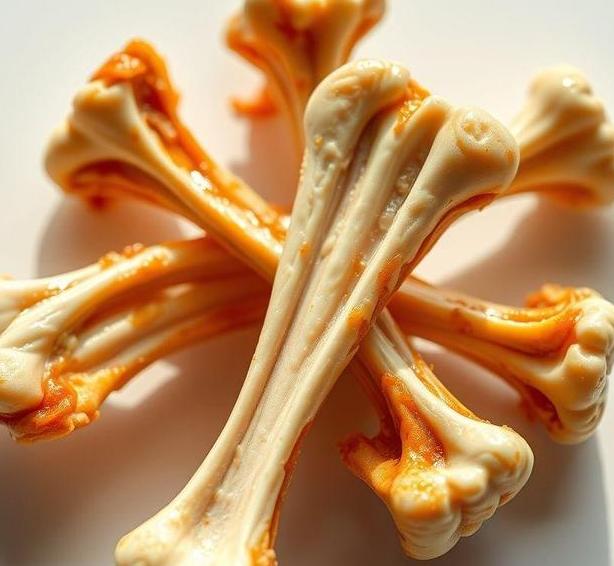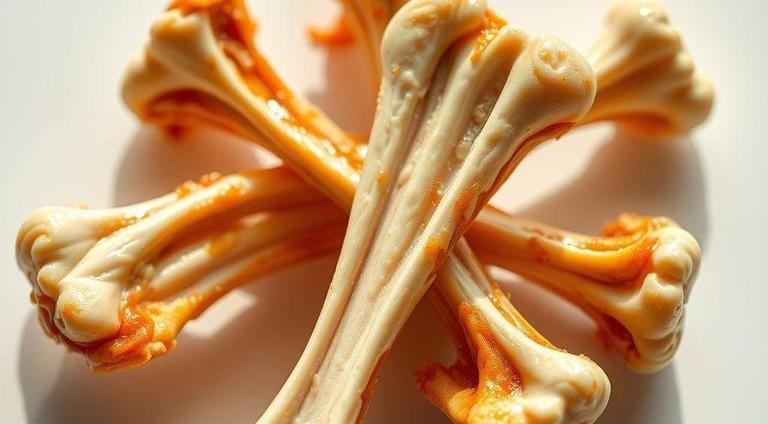Chicken bones, often leftover from hearty meals, hold a variety of uses in the kitchen. Whether you’re making broth, soup, or simply storing them for future use, it’s essential to understand the best practices for handling them. While the flesh of chicken may get all the attention, chicken bones have a valuable role too. However, like any food item, they come with their own risks if not stored properly. Can chicken bones go bad? This is a question that many might not consider until it’s too late.
In this guide, we’ll take a deep dive into everything you need to know about chicken bones-how to store them, how long they last, and what signs to look out for when they’ve gone off. You’ll also get expert tips on making the most of your leftover bones. By the end of this read, you’ll be able to handle chicken bones like a pro.
Can Chicken Bones Go Bad?
Yes, chicken bones can indeed go bad, even though they are not ’perishable’ in the same way raw or cooked chicken meat is. The bones themselves, especially when left alone after a meal, are vulnerable to spoilage, and improper storage can cause them to develop harmful bacteria or lose their flavor over time.
Here are some key reasons why chicken bones can spoil:
- Bacterial Growth: Leftout bones can develop bacteria, especially if they’re not refrigerated or cooked right away.
- Dehydration and Drying: If bones aren’t properly stored, they can dry out, leading to a loss of flavor and texture.
- Fat Rancidity: Chicken bones still have bits of meat and fat, which, when left untreated, can go rancid and smell bad.
- Environmental Contaminants: Storing bones in improper conditions can expose them to germs, mold, and other environmental contaminants.
Even though bones themselves may seem durable, it’s the combination of residual fats, moisture, and bacteria that leads them to spoil. Always take proper steps to store them correctly to avoid waste or health issues.
Shelf Life For Chicken Bones

Chicken bones don’t last indefinitely, even in the best of storage conditions. The shelf life will depend on how you store them and the type of bone you’re dealing with-whether it’s cooked, raw, or has residual meat attached. Here’s a quick breakdown:
-
Raw Chicken Bones
- In the Fridge: Raw chicken bones should be kept in the refrigerator and will last about 1-2 days. After this, they can spoil quickly due to bacteria growth.
- In the Freezer: When frozen, raw chicken bones can last for about 6-12 months. If you’re planning to keep them for longer, freezing is your best bet.
-
Cooked Chicken Bones
- In the Fridge: Cooked chicken bones should be stored in the fridge and will last 3-4 days before they begin to degrade.
- In the Freezer: Freezing cooked chicken bones will extend their shelf life to about 6 months.
The fat and moisture in chicken bones play a significant role in how long they stay good. The longer you wait to store them, the higher the chance for bacterial growth, and the more likely they are to lose their useful properties for making broths or other dishes.
Common Signs Of Spoilage
You should always be aware of signs that your chicken bones are no longer good. When bones go bad, it’s not just about their smell or appearance but also how they may affect the food you’re cooking. Here’s what to look out for:
- Off Smell: Fresh chicken bones may have a faint smell of cooked meat or broth. Spoiled chicken bones, however, can emit a sour, rotten odor. This is a clear sign that bacteria have taken over.
- Discoloration: While fresh bones will maintain a consistent, pale appearance, any greenish or grayish hue indicates they’ve gone bad. The discoloration comes from bacteria, mold, or oxidation.
- Sticky or Slimy Texture: If the bones feel sticky or slimy to the touch, that’s a sign that they’ve begun to decompose. The residue comes from bacteria or yeast buildup on the surface of the bone.
- Visible Mold: Mold is an obvious sign of spoilage, and it can appear as fuzzy patches on the bone or on the surrounding meat.
- Cracking or Brittle Texture: If bones start cracking easily when you handle them, they might be too dry or have lost their moisture, which makes them less effective for things like broth.
If you notice any of these symptoms, it’s best to dispose of the bones to avoid contamination.
How To Store Chicken Bones?

Proper storage is key to extending the shelf life of chicken bones and maintaining their quality. Here’s how to store them, depending on your needs:
-
In The Refrigerator
- Storage Container: Store the bones in an airtight container or ziplock bag. This prevents exposure to air and minimizes the chances of contamination.
- Keep Them Cool: Make sure your fridge is at the correct temperature (below 40°F or 4°C). Anything higher can encourage bacteria growth.
- Use Within 1-3 Days: As mentioned, chicken bones are best used within a few days of cooking. After that, their quality starts to degrade.
-
In The Freezer
- Freezer Bags: For long-term storage, put the bones in freezer-safe bags, removing as much air as possible. You can even double-bag to be extra sure.
- Labeling: Write the date on the bag so you know when you froze them and can keep track of how long they’ve been stored.
- Freezer Containers: Alternatively, you can use a freezer-safe container with a tight-fitting lid to prevent moisture loss.
- Use Within 6-12 Months: While frozen bones don’t spoil as fast as refrigerated ones, they can lose flavor and texture after about 6 months, so it’s best to use them within that time frame.
-
For Broths And Soups
- If you plan on making broth, it’s best to process the bones within a couple of days of cooking. Otherwise, store them frozen and thaw when you’re ready to cook. If you want to enhance the flavor, you can even freeze the broth separately!
Expert Tips
Here are some expert tips to ensure your chicken bones are preserved in the best way possible:
- Use Vacuum Sealing: For longer-term storage, vacuum-sealing chicken bones removes air and moisture, providing a better seal and extending shelf life. This is especially useful if you’re a meal prepper or like to make large batches of broth.
- Clean the Bones: Before freezing, consider removing any remaining meat from the bones. This reduces the chances of attracting bacteria or mold, and it helps keep your freezer organized.
- Use Bone Broth Quickly: After making bone broth, store it in a sealed container, and use it within 4-5 days in the fridge. If you don’t plan on using it soon, freeze the broth for up to 6 months.
- Smell Test: Before cooking with chicken bones that have been stored for a while, give them a smell check. Even if they look fine, the odor will usually tell you if they’re past their prime.
- Don’t Skip Freezing If You Can’t Use Them Soon: Freezing is your best option if you can’t get to the bones within a couple of days. It locks in nutrients and flavor and prevents spoilage.
FAQs
Can Chicken Bones Go Bad If Left Out At Room Temperature?
Yes, chicken bones can go bad if left out at room temperature for more than 2 hours. Bacteria can multiply rapidly in warm conditions, increasing the risk of foodborne illness.
How Long Can Chicken Bones Be Safely Stored In The Fridge?
Chicken bones can be safely stored in the fridge for 3 to 4 days. After this period, the risk of bacterial growth increases, and they should be discarded.
Can Cooked Chicken Bones Go Bad Faster Than Raw Chicken Bones?
Yes, cooked chicken bones may spoil faster than raw bones because the cooking process can break down their structure, making them more prone to bacterial contamination. They should be consumed or stored within a shorter time frame.
What Are The Signs That Chicken Bones Have Gone Bad?
Signs that chicken bones have gone bad include an unpleasant sour smell, a slimy texture, discoloration, or mold growth. If any of these signs are present, discard the bones immediately.
Can Chicken Bones Be Safely Frozen For Later Use?
Yes, chicken bones can be frozen for later use, such as in making broth. They should be stored in an airtight container or freezer bag and can be kept in the freezer for up to 6 months.
Is It Safe To Consume Chicken Bones After They Have Been Frozen And Thawed?
If chicken bones have been frozen and properly thawed, they are generally safe to use, but it’s essential to check for any signs of spoilage such as unusual odor or texture. If in doubt, discard them.
Can Chicken Bones Go Bad In Broth Or Soup?
While the broth or soup itself may remain safe for a period of time, chicken bones in broth can degrade over time. After 3 to 4 days in the fridge, the bones should be discarded to prevent bacterial contamination.
Do Chicken Bones Become Unsafe To Eat After They Go Bad?
Yes, chicken bones that have gone bad should not be eaten. Consuming spoiled bones can lead to foodborne illness due to bacteria such as Salmonella or E. coli.
Can Chicken Bones Go Bad In A Dog’s Food Bowl?
Yes, chicken bones can go bad in a dog’s food bowl if left out too long. Like with human consumption, they should not be left at room temperature for more than 2 hours. It’s also important to avoid giving cooked bones to pets, as they can splinter.
Can Chicken Bones Be Reused After Going Bad?
No, once chicken bones have gone bad, they should not be reused for any purpose. Reusing spoiled bones can pose serious health risks due to bacterial contamination and degradation.